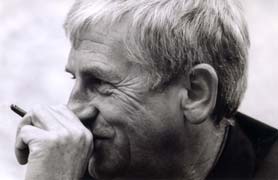
Arnold Stadler
- Germany
- Zu Gast beim ilb: 2007
Arnold Stadler was born in Meßkirch in 1954, and grew up on a farm in the nearby village of Rast. He studied Roman Catholic theology in Munich and Rome, and later German Studies in Freiburg and Cologne. During his childhood he was a server in church and experienced the beauty and magic of language for the first time in the Latin prayers. The effects of these early influences are to be found in his studies and writing. His thesis was on »The Book of Psalms and German Poetry of the Twentieth Century«, and two further publications also deal with the Psalms. Their rendering in German »Warum toben die Heiden und andere Psalmen« (1995; t: Why do the heathens rage and other psalms) and »Die Menschen lügen. Alle« (1999; t: People lie. All of them) emphasize their poetic quality, at the same time locating them in the context of contemporary language.
His rural farming background, the yearning for an experienced and yet vanished world, are paid tribute by Stadler in his semi-autobiographical novels. In the search for this home, in »Ich war einmal (1989; t: Once I was) and »Mein Hund, meine Sau, mein Leben« (1994; t: My dog, my pig, my life), a typically characteristic melancholic tone comes to the fore. It is not a perfect world that is at once being summoned up and abandoned. Stadler juxtaposes painful experiences with comic elements, exposing the seeming idyll. Worldly feelings, above all the initiation into love, with all its joy and suffering, are the subject of the novel »Sehnsucht. Versuch über das erste Mal« (2002; t: Desire: an attempt at the first time). Here too, elevated feelings are pierced by an ironically biting social critique.
Stadler’s influences and mentors in literature are to be found mostly among those great writers who embrace and use digressions and elliptical discourses as literary devices. As early as thirteen he read Stifter’s »Indian Summer«. Stadler remained loyal to the poet throughout his life, and published »Mein Stifter« (t: My Stifter), a personal account of and homage to his adopted relative Adalbert Stifter, in 2005, that is for the 200th anniversary of his birth, in which he also defended Stifter against Thomas Bernhard’s criticisms in »Old Masters«.
In an essay published in »Der Spiegel« in 1994, Martin Walser championed Stadler. In the same year the author received the Hermann Hesse Prize to foster talent. Numerous other awards followed, including the Nicolas Born Prize to foster talent and the Marie Luise Kaschnitz Prize. The recognition of his work culminated in 1999 with the award of the prestigious Büchner Prize and the commercial success of his novel »Ein hinreißender Schrotthändler« (t: An adorable junk dealer), which tells the story of a love triangle. Stadler’s latest novel, »Komm, gehen wir« (2007; t: Come on, let’s go) also gives an account of the meeting of two men and a woman, this time in 1970’s Italy, and makes explicit references to its precursors, Truffaut’s »Jules et Jim« and Pasolini’s »Teorema«.
The author, who was awarded an honorary doctorate by the Freie Universität in Berlin in 2006, lives in Rast and Berlin.
© international literature festival berlin
Das Buch der Psalmen und die deutschsprachige Lyrik des 20. Jahrhunderts
Kölner germanistische Studien
Köln, 1986
Ich war einmal
Residenz Verlag
Salzburg, Wien, 1989
Mein Hund, meine Sau, mein Leben
Residenz Verlag
Salzburg, Wien, 1994
Warum toben die Heiden und andere Psalmen
Residenz Verlag
Salzburg, Wien, 1995
Johann Peter Hebels Unvergänglichkeit
Mayer
Stuttgart, 1997
Der Tod und ich, wir zwei
Suhrkamp
Frankfurt/Main, 1998
Die Menschen lügen. Alle
Insel
Frankfurt/Main, 1999
Ein hinreißender Schrotthändler
DuMont
Köln, 1999
Volubilis
Isele
Eggingen, 1999
Sehnsucht. Versuch über das erste Mal
DuMont
Köln, 2002
Tohuwabohu [Hg.]
DuMont
Köln, 2002
Mein Stifter
DuMont
Köln, 2005
Ausflug nach Afrika
DuMont
Köln, 2006
Komm, gehen wir
Fischer
Frankfurt/Main, 2007
